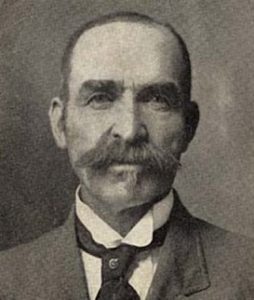
R. B. Fitzgerald
*This date celebrates the birth of R. B. Fitzgerald, a Black brickmaker and businessman, in 1843.
Richard Burton Fitzgerald was born in New Castle County, Delaware, to Thomas and Sarah (Burton) Fitzgerald. His father was Mulatto of African and Irish ancestry and emancipated from slavery by a white father and master. His mother, who was white and of English ancestry, decided to raise her sons within a community of free people of color.
Growing up, Richard was described by his great-niece, Pauli Murray, as a "sturdy, rough and tumble fellow... who could work hard but cared more for good times" than he did for studying. At night, his more studious brother Robert would teach Richard and his siblings what Robert had learned in school that day, as both Richard and their brother William ("Billy") worked in their father's brickyard rather than attend the local Quaker school. In 1855, the Fitzgerald family moved to a farm near Hinsonville in Chester County, Pennsylvania. They wanted to reduce the risk to their children of being kidnapped by slave catchers under the Fugitive Slave Act of 1850.
At the beginning of the American Civil War, Fitzgerald joined the Quartermaster Department as a civilian contractor in Philadelphia, as blacks were not yet allowed to serve in the military. In 1862, he was transferred to the Army of the Potomac's Washington supply base; Fitzgerald "went to sea" later in the war, likely as a merchant seaman. On April 4, 1870, Richard married Sarah ("Sallie") Ann Williams at her parents' house. They had at least 12 children together: six boys and six girls. Sons Burke and Samuel followed their father into brickmaking; Samuel continued the family business after his father's death.
In 1879, Fitzgerald moved his family to Durham, accompanied by his brother Robert, based on potentially favorable financial prospects within the developing tobacco manufacturing economy. "In Durham, Richard Fitzgerald bought a large tract with a good vein of clay for brick. Here he began a brickyard and built an eighteen-room house shaded by a grove of maples and magnolias". According to his grandniece, Pauli Murray, "Within the next fifteen years, Uncle Richard became Durham's leading brick maker. By 1884, he had a large brickyard on Chapel Hill Road and orders for two million bricks". Tobacco manufacturer William T. Blackwell told Fitzgerald he would purchase all the bricks he made.
By 1910 Fitzgerald was producing "30,000 bricks a day from his $17,000 plant but owned besides 100 acres of land within the city limits and had $50,000 worth of real estate. Thirty years of brickmaking (i.e., before 1913) had "netted Fitzgerald a big brickyard with a $6000 cement dryer, which makes it possible to turn out brick at all seasons; a yard whose capacity is 30,000 bricks per day, and whose value, including ten acres of land, is $17,000." His holdings in 1913 were valued conservatively at $100,000. Besides brickmaking, Fitzgerald was involved in many other business ventures. In 1885, he purchased newspaper printing equipment to start a newspaper for the Black community in Durham; no known editions survive, and it is unknown if he published it.
In 1895, Fitzgerald and four others founded the Durham Drug Company, which was renamed the Fitzgerald Drug Company in 1901. The company operated until 1910, when its name was changed. Additionally, in 1901, Fitzgerald became the treasurer of Lincoln Hospital, which was founded for African Americans. In 1898, he became the first president of the Coleman Manufacturing Company in Concord, North Carolina. This was the first cotton mill in the United States to be built, owned, and operated by Blacks. Fitzgerald was president of the Durham Real Estate, Mercantile, and Manufacturing Company, which was incorporated in 1899. It was "formed under the laws of the State of North Carolina to promote manufacturing and mercantile interests" for Blacks.
He was among the original incorporators of Mechanics and Farmers Bank, which received its charter from the State of North Carolina in 1907. It opened its office in 1908 in the North Carolina Mutual Life Insurance Company Building on Parrish Street, known as the city's “Black Wall Street." Richard R. B. Fitzgerald died on March 24, 1918. He is buried in what is known as the Fitzgerald section of the Maplewood Cemetery in Durham, which the Maplewood Cemetery later annexed.